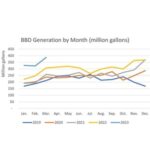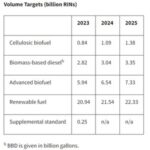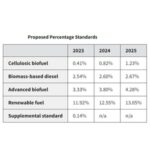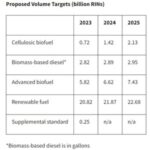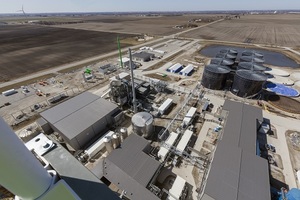Hinson, Craig urge EPA to increase advanced biofuel RVOs
Energy Disrupter
ADVERTISEMENT
A group of 37 representatives led by Reps. Ashley Hinson, R-Iowa, and Angie Craig, D-Minn., on April 11 sent a letter to U.S. EPA Administrator Andrew Regan urging the agency to increase its proposed 2023, 2024 and 2025 Renewable Fuel Standard renewable volume obligations (RVOs) for advanced biofuel and biomass-based diesel.
“The Renewable Fuel Standard is an important tool used to support the production and use of sustainable homegrown energy sources, and EPA’s proposed RVOs represent an opportunity to facilitate further growth in this critical sector,” they wrote. “We are concerned that the proposed RVOs for advanced biofuels, particularly biomass-based diesel, represent a step in the wrong direction and threaten to derail the significant progress made by the industry in recent years.”
The letter indicates that U.S. consumption of biodiesel and renewable diesel reached 3.1 billion gallons last year and cites U.S. Energy Information Administration data that projects renewable diesel capacity will double to 5.9 billion gallons by the end of 2025. “EPA’s proposed blending targets for biomass-based diesel account for less than 10 percent of the volume increases estimated by EIA, reaching only 2.95 billion gallons in the final year,” the representatives wrote.
“This draft rule fails to account for the existing capabilities of the industry, let alone for its continued growth,” they continued. “It also fails to take into account expanded feedstock availability, including new soybean crushing capacity, enhanced distillers corn oil capture, and the recently finalized canola oil pathway for renewable diesel.”
The representatives also stress that the biobased diesel industry supports more than 75,000 jobs and contributes more than $23 billion to the U.S economy each year. “If finalized, the proposed RVOs for biomass-based diesel would not only represent a missed opportunity to reduce greenhouse gas emissions, but it would also result in a negative economic impact for many farmers and rural communities,” they wrote.
Clean Fuels Alliance America is thanking the representatives for their action and urging the EPA to raise the biomass-based diesel RVOs in its upcoming rulemaking. “The clean fuels industry thanks the bipartisan group of Congress members for prompting EPA to support industry growth and investment that are aimed at achieving the goals of the RFS,” stated Kurt Kovarik, vice president of federal affairs with Clean Fuels. “The biodiesel and renewable diesel industry is meeting 5 percent of the nation’s demand for heavy-duty fuels and is helping keep consumer prices in check right now. Increased production and use of these advanced biofuels supports energy security, economic opportunities, and environmental benefits.”
The Iowa Biodiesel Board is also commending the representatives for their support of the biobased diesel industry. “We applaud Rep. Hinson for her leadership in trying to convince EPA to take a stronger course of action with biodiesel under the RFS,” said Grant Kimberley, executive director of the IBB. “As the letter states, this draft rule ‘fails to account for the existing capabilities of the industry, let alone for its continued growth.’
“With one hand, the Biden administration seeks rapid decarbonization and has thrown down the gauntlet with programs like the Sustainable Aviation Fuel Grand Challenge, and more investment in the Higher Blends Infrastructure Incentive Program. Yet with the other hand, the same administration is holding back a fuel that can immediately decarbonize existing diesel technology – a technology likely to continue to fuel the economy for decades to come,” he added.
“The proposed rule also neglects to recognize the nearly $5 billion in investments on the line to increase soybean crush capacity, which would greatly enhance the feedstock availability for biofuels like biodiesel,” Kimberley continued. “About $590 million of this is in Iowa. Many of these investments, along with other biomass-based diesel plant investments, were made with EPA’s original promise of RFS growth top of mind. We urge EPA to hear what these representatives are saying, and maximize biodiesel’s powerful contributions to our economy and environment.”
A full copy of the letter is available on Hinson’s website.



